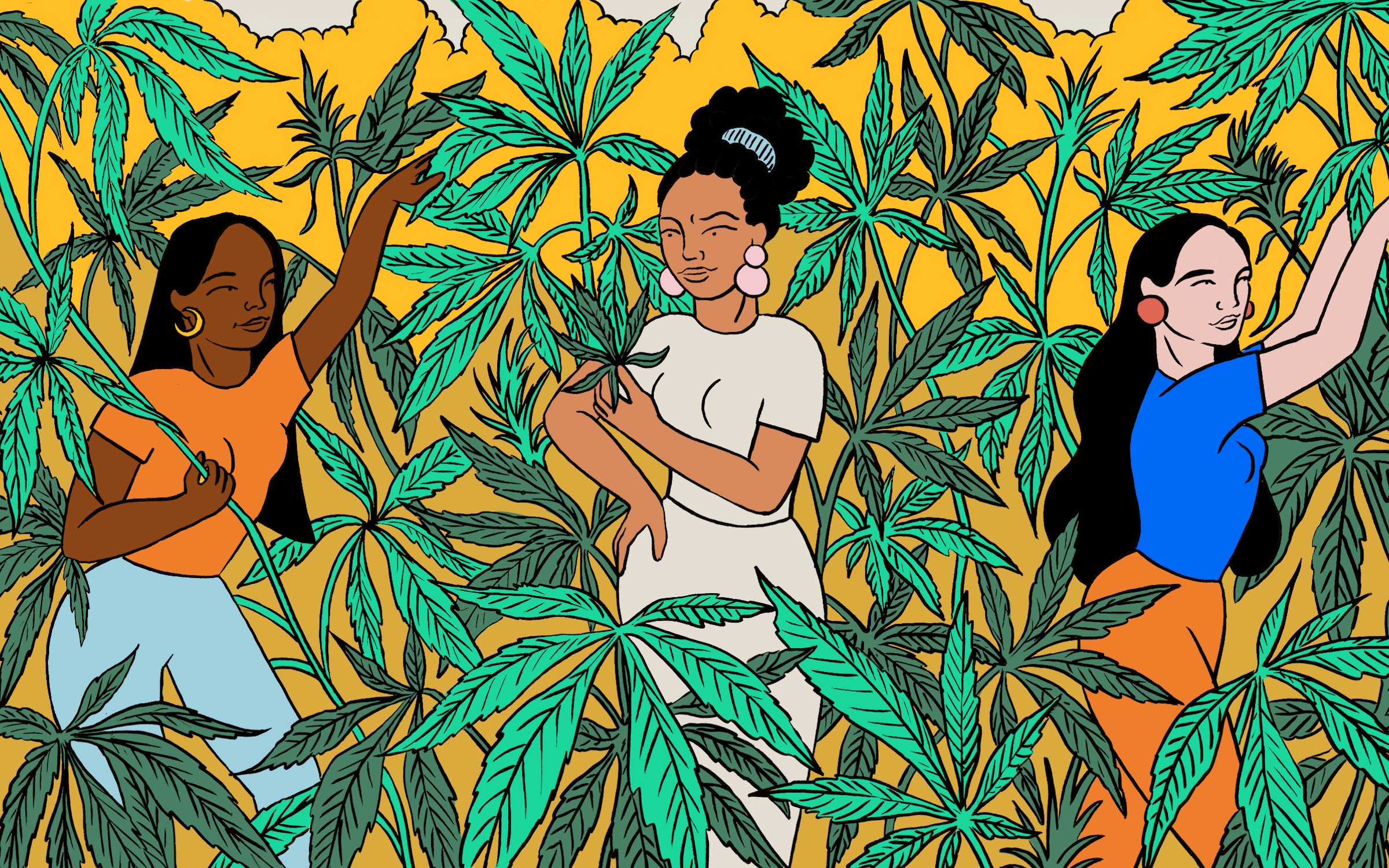Studies suggest women are using marijuana as a libido enhancer. Does it work?
 Illustration: Felicity Marshall
Illustration: Felicity Marshall
 When Becky Lynn got a call from a California police station that her teenage daughter was in a car accident, she ran out of the house in the clothes she had on: tie-dye shorts and a T-shirt emblazoned with the modern portmanteau, ?Cannaboss.? Both were souvenirs from April?s National Cannabis Festival, where Lynn, a gynecologist specializing in sexual medicine, appeared on one of the panels interweaved with yoga classes in the festival?s wellness pavilion.
When Becky Lynn got a call from a California police station that her teenage daughter was in a car accident, she ran out of the house in the clothes she had on: tie-dye shorts and a T-shirt emblazoned with the modern portmanteau, ?Cannaboss.? Both were souvenirs from April?s National Cannabis Festival, where Lynn, a gynecologist specializing in sexual medicine, appeared on one of the panels interweaved with yoga classes in the festival?s wellness pavilion.
Her daughter was mortified by her getup, but otherwise fine. And while Lynn wasn?t worried about the medicolegal consequences of appearing in marijuana merch in public ? especially in a state where it?s legal ? she understood her daughter?s chagrin.
?It?s so not me,? she says. ?I?m a physician, I?m a scientist ? I?m not a stoner. But I dunno ? your teenager is always going to be embarrassed by you.?
While she may not use marijuana herself, Lynn has a keen interest in how cannabis might help the women she sees in her St. Louis, Missouri office. Her interest was first piqued when several women confided to her that they used marijuana to improve their libido, and that they believe it helps them achieve otherwise elusive orgasms. ?When I looked in the scientific literature, there really wasn?t much data at all,? she says. ?I looked on the internet ? it was exactly the opposite.?
The discrepancy led her to do her own study, and in March 2019, that study became one of the largest to describe how some women are using marijuana for better sex: of nearly 400 women completing her anonymous questionnaire,127 said they used the drug before sex, and reported better sex drives and more than twice the odds of satisfactory orgasms compared to non-users. Lynn?s study doesn?t irrefutably prove marijuana leads to better sex for women, but it demonstrates women aren?t waiting on proof to use it that way. ?Women do think that it can improve the sexual experience, improve drive, improve orgasm, lessen pain,? says Lynn.
?I see so many women that come into my office that are really distressed by their low desire.?
Previous research suggests women have been thinking along those lines for at least 50 years. A 1972 survey by the National Commission on Marihuana and Drugs found reports of increased sexual desire among 44% of marijuana users, with women more likely than men to say the drug increased their desire. In a 1982 survey, three-quarters of women who regularly used marijuana reported increased sexual pleasure and satisfaction when using the drug, while two-thirds reported a greater sense of intimacy and one-third reported better orgasms.
Other studies have generally reported similar results. Many also note that while these positive effects are present at lower doses of marijuana, they decrease as marijuana consumption increases. Many also note a less consistent effect on men?s sexual function than on women?s, possibly as a result of deleterious effects on erectile function.
Although men have a variety of effective pharmacologic options to treat erectile dysfunction, there are only two U.S. Food and Drug Administration (FDA)-approved drugs for low libido and other sexual function problems in women ? and they?re plagued by problems. Flibanserin (brand name Addyi), has demonstrated only meager improvements in female libido, giving women only half an additional ?sexually satisfying event? ? an FDA term ? per month. Furthermore, it?s recommended that women abstain from alcohol within two hours of taking flibanserin ? a daily medication. Although the recently approved bremelanotide (brand name Vyleesi) is more effective and has a better safety profile, it only comes in injectable form ? and costs $950 for a four-pack (flibanserin costs $400 for a month?s worth of pills).
Marijuana?s success in observational studies would logically make it an obvious target for more rigorously designed clinical studies. However, until recently, it was illegal to test cannabis and its chief psychoactive compound, tetrahydrocannabinol (THC), on humans. Most of the data on marijuana?s neurobiology comes from female rats. Because animal and human biology often diverge in unpredictable ways, animal models of drug effects are often and rightly viewed with caution ? but in domains of female sexual function, rats have ?predictive validity,? says Jim Pfaus, a neuroscientist specializing in the biology of female sexual response.
?Anything that increases [sexual desire] in female rats increases sexual desire in women,? says Pfaus. ?That?s been shown with flibanserin, and with bremelanotide,? he says, and it?s been shown even more broadly with THC. Studies in the 1970s and 1980s showed that THC in female rats stimulated ?precopulatory vocalizations,? or the sexual solicitation of male rats, and lordosis, a ?come-and-get-it? back arch that precedes mating.
In the rat studies involving flibanserin and bremelanotide, effects were seen mostly in the domain of solicitation, which accurately predicted both drugs? positive effects on women?s libidos. THC?s broader effects signal to Pfaus that marijuana not only increases sexual desire, but also arousal ? and, it may also promote female orgasm. ?If it does, that?s potentially amazing. Women that have had orgasm disorders may not have orgasm disorders anymore,? he says.
How might marijuana work as a libido enhancer in women? Low doses of marijuana impact cannabinoid receptors throughout the human body, including in the brain, and have been shown to reduce anxiety and pain, both of which can interfere with arousal. Additionally, marijuana is thought to dilate the blood vessels throughout the reproductive tract, making the genitals ? including the clitoris ? more sensitive.
Scientists have also speculated that marijuana?s potential comes from its ability to change the effects of dopamine and serotonin, neurotransmitters with broad effects throughout the body. But until marijuana can be studied broadly in human clinical trials, the mechanism of marijuana?s effects remains unclear.
Marijuana?s pivot from promise to proof is limited by U.S. federal policy. While any other drug with the same libido-boosting potential would likely be the subject of fervent biomedical research, marijuana?s federal classification as a Schedule 1 drug means that federal officials classify it as having ?no currently accepted medical use and a high potential for abuse.? This severely limits scientists? ability to study it.
For now, only one type of marijuana can legally be used in the U.S. for research purposes: the stuff grown at the University of Mississippi, whose single research strain (dubbed ?Mississippi Mud? by scientists) is notorious for its inconsistent, often pitiable quality and relative weakness compared to most real-world marijuana. That may soon change; in August, the federal government announced it would begin considering applications for permission to cultivate marijuana for research.
Even after everything she?s learned through practice and scholarship, Lynn says the absence of high-quality data on marijuana?s safety and efficacy in improving women?s sex lives makes her deeply reluctant to recommend its use to her clients. She hopes better data is coming: ?Once it?s legal,? she says, ?those kinds of trials will be getting done.?
Until then, she says, ?I can?t in any good faith say, ?Go out and do this because it?s going to work.??
Even if she wanted to recommend marijuana for better sex, doing so would endanger her medical license. Although a bill legalizing medical marijuana for certain conditions was recently approved in Missouri, it is not yet legal to prescribe the drug within state lines ? and disorders of female sexual function are not on the list of approved indications.
It infuriates Lynn that low desire in women isn?t taken seriously as a medical concern. ?There?s a side that says, ?This is ridiculous ? we?ve medicalized sex, we?ve created a problem where there is no problem,?? she says, ?and I absolutely disagree with that. I see so many women that come into my office that are really distressed by their low desire.?
Marijuana may not be the answer for everyone, but at least for some women, it?s already used as a libido enhancer. Now the science, and regulation, needs to catch up.


